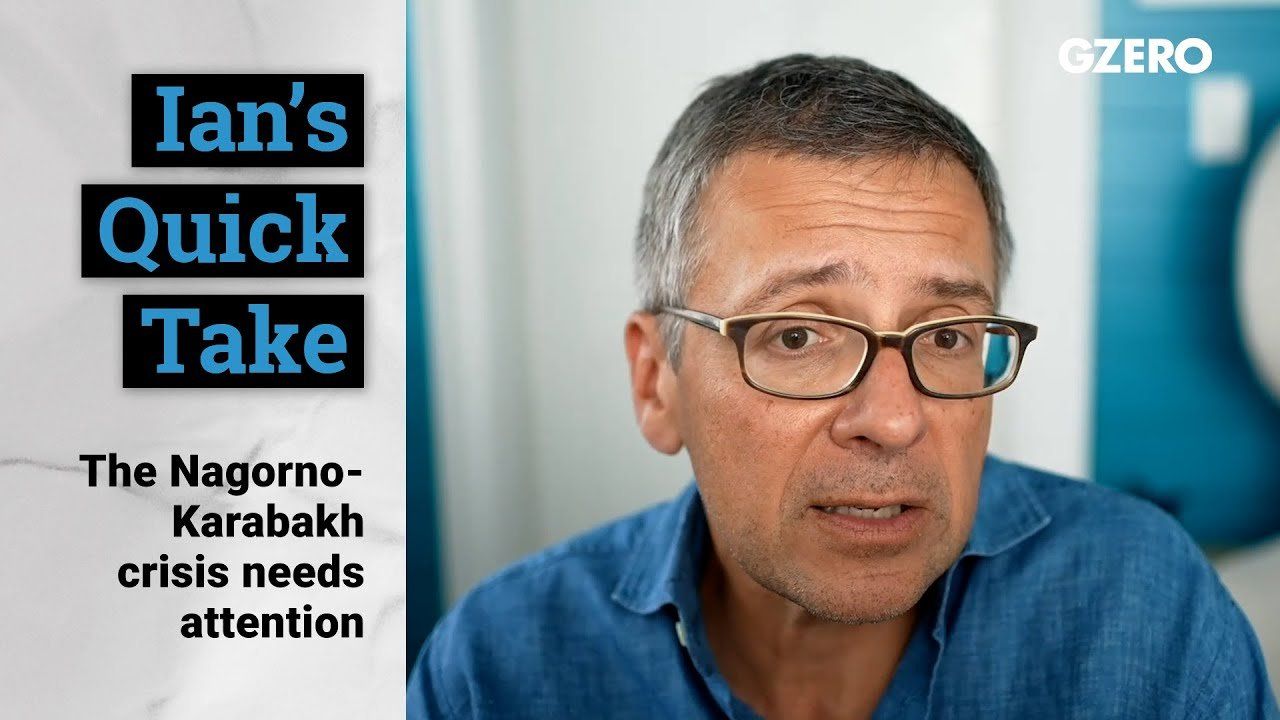Quick Take
Armenia, Azerbaijan & the Nagorno-Karabakh crisis that needs attention

The Nagorno-Karabakh crisis needs attention | Quick Take | GZERO Media

Ian Bremmer's Quick Take:Hi everybody. Ian Bremmer here and a Quick Take to kick off your week.
I want to talk about an issue that is not getting the attention that it should, and that is the conflict in Nagorno-Karabakh. It is one of many impacts from the Russian war in Ukraine. Not new. There's been a war for decades over this little territory, an autonomous Armenian populated territory inside Azerbaijan, former two Soviet republics.
Armenia and Azerbaijan became independent in 1991 when the Soviet Union collapsed. It is small, it is mountainous, it is all of 120,000 people. It is fiercely contested. When the Soviet Union collapsed, in part would support from Russia, Armenia had military superiority. They were able to not only have control over it, but also buffer regions bordering it. They didn't negotiate very seriously with the Azeris, in part because they had the upper hand. That is now changing. Azerbaijan has been building up their own military capabilities, in part from a lot of energy wealth from the Caspian, in part with support from Turkey, which is very aligned with Azerbaijan.
Meanwhile, Russia, which is Armenia's major supporter, really their only kind of strong geopolitical supporter with troops in Armenia and peacekeepers on the ground, very distracted given the invasion of Ukraine and under a lot of pressure. That has meant reduced troop presence and them acting largely on the sidelines. Azerbaijan, sensing opportunity, struck, took back occupied territory around Nagorno-Karabakh, and now have a functional lock on any ability to get in or out of the territory.
Now, Armenia, the Armenian government itself in Yerevan, has said that they are willing to renounce claims on this territory. They no longer see it as part of Armenia if these Armenians are given guarantees of rights and autonomy. That is not the view, at least not therefore, not thus far of the local government in Karabakh.
Meanwhile, in Azerbaijan, they have cut off the humanitarian corridor. In part, this is to force the local Armenians to the table, but it's also a massive humanitarian crisis. And there is now a real possibility that 120,000 people are going to face starvation.
And that's why I'm bringing this up right now. Look, there are lots of places around the world that need more international attention, and GZERO Media is trying our best to shine more of a light on them in Haiti, in Niger, in Yemen. Well, you can now add Karabakh to that list. And international pressure from the US, from the Europeans, from the Japanese, from everyone is needed to get that humanitarian assistance in immediately. And then hopefully, and quite plausibly a deal that allows both Armenian and Azeri populations to live in peace.It's a small territory. These are not very powerful countries. A little bit of pressure and focus from these governments, from the G-7 governments in particular would go a long way. Turkey is a NATO ally of the United States. They have a lot of influence over the Azeris, but it's not hitting the headlines right now. And in that regard, it's worth all of us doing a little bit more.
So hopefully this makes a tiny bit of difference. You can spread the word too. I thank you for your attention for a few moments this summer. And I hope everyone's doing well. Thanks a lot.
Think you know what's going on around the world? Here's your chance to prove it.
Xi Jinping has spent three years gutting his own military leadership. Five of the seven members of the Central Military Commission – China's supreme military authority – have been purged since 2023, all of whom were handpicked by Xi himself back in 2022.
From a resilient but divided consumer economy to cooling small business hiring, tighter housing affordability, and AI’s shift from buzzword to economic engine, 2025 revealed a “K-shaped” recovery and rapid technological transformation. Bank of America Institute’s 2025 Year in Review distills the data behind the year’s defining trends. Explore the 2025 Year in Review from Bank of America Institute.